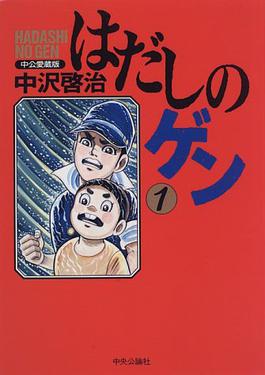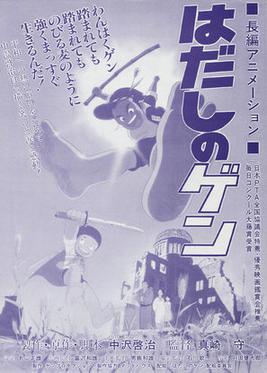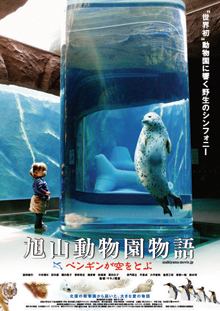
Keiji Nakazawa was a Japanese manga artist and writer.

Barefoot Gen is a Japanese historical manga series by Keiji Nakazawa, loosely based on Nakazawa's experiences as a survivor of the Hiroshima atomic bombing. The series begins in 1945 in and around Hiroshima, Japan, where six-year-old Gen Nakaoka lives with his family. After Hiroshima is destroyed by the bombing, Gen and other survivors deal with the aftermath. The series was published in several magazines, including Weekly Shōnen Jump, from 1973 to 1987. It was adapted into three live-action film versions directed by Tengo Yamada, which were released between 1976 and 1980. Madhouse released two anime films, one in 1983 and the other in 1986. In August 2007, a two-night live-action television drama series aired in Japan on Fuji TV.
Kazuo Oga is an art director and background artist for many Madhouse Studio and Studio Ghibli anime films. Oga has worked with major directors Hayao Miyazaki, Isao Takahata, Yoshiaki Kawajiri, Osamu Dezaki. He also published two artbooks and directed a short animated film.
Kentarō Haneda was a Japanese pianist, composer and arranger. He composed for popular anime series, movies and video games. His popular name was Haneken.
Tales of the Unusual is a 2000 Japanese horror anthology film directed by Mamoru Hoshi, Masayuki Ochiai, Hisao Ogura and Masayuki Suzuki. Each story is of a different genre - "One Snowy Night" (horror), "Samurai Cellular" (comedy-drama), "Chess" (thriller) and "The Marriage Simulator" (romance-drama). It is the special film version of the long-running TV drama series of the same name (世にも奇妙な物語).

Shōnen Big Comic was a bi-weekly manga magazine published by Shogakukan in Japan from 1979 to 1987. From 1976 to 1979, the magazine was titled Manga-kun (マンガくん) before being renamed Shōnen Big Comics in 1979. In 1987, the magazine changed format and was renamed Weekly Young Sunday. Several of the series appearing in Shōnen Big Comic have been adapted into anime, including Esper Mami, Area 88, and Miyuki.

Our Blood Will Not Forgive is a 1964 Japanese film by the noted filmmaker Seijun Suzuki. It stars Akira Kobayashi and Hideki Takahashi as two brothers who seek revenge on the yakuza for the death of their father.
On Wings of Love is a 1957 Japanese romantic musical film directed by Toshio Sugie. It was Toho's highest-grossing film of the year and the first film released in Tohoscope.

Barefoot Gen is a 1983 Japanese adult animated war drama film loosely based on the Japanese manga series of the same name by Keiji Nakazawa. Directed by Mori Masaki and starring Issei Miyazaki, Masaki Kōda and Tatsuya Jo, it depicts World War II in Japan from a child's point of view revolving around the events surrounding the bombing of Hiroshima and the main character's firsthand experience of the bomb.
This is a list of cultural products made about the atomic bombings of Hiroshima and Nagasaki. It includes literature, film, music and other art forms.

Barefoot Gen is a two-part Japanese television special based on the popular manga of the same name by Keiji Nakazawa.

Barefoot Gen 2 is a 1986 Japanese adult animated drama film and the sequel to the 1983 animated war film Barefoot Gen, loosely based on the Japanese manga series by Keiji Nakazawa. Directed by Toshio Hirata, the film stars Issei Miyazaki, Masaki Kōda, Yoshie Shimamura, and Taeko Nakanishi, who reprise their roles from the first film, while Kei Nakamura and Takami Aoyama join the cast. In the film, Gen and Ryuta Nakaoka join a gang of orphan scavengers and attempt to save their mother Kimie from radiation sickness, a consequence of her survival of the Hiroshima atomic bombing.

Barefoot Gen: Explosion of Tears is a 1977 Japanese war drama film, directed by Tengo Yamada based on the Japanese manga series by Keiji Nakazawa. It is a sequel to the 1976 film Barefoot Gen and is the second live-action film based on the manga.
Barefoot Gen Part 3: Battle of Hiroshima is a 1980 Japanese war drama film, directed by Tengo Yamada. It is the third installment in the Barefoot Gen live-action film series.
Arashi is a 1956 Japanese film directed by Hiroshi Inagaki. It was entered into the 7th Berlin International Film Festival.

Asahiyama Zoo Story: Penguins in the Sky is a 2009 Japanese film.
Barefoot Gen is a Japanese manga series by Keiji Nakazawa.

Meganebu! is a 2013 anime television series produced by Studio Deen and directed by Soubi Yamamoto, which is based on a series of Drama CDs released by Deen in 2011-2012. The series follows the activities of five male students who belong to their school's Glasses Club and the antics resulting from their shared passion for eyewear. The series premiered on Tokyo MX on October 6 and ended on December 22, 2013.
Kōji Wada was a Japanese actor.
The Wandering Guitarist is a 1959 Japanese action and yakuza film directed by Buichi Saitō. It stars Akira Kobayashi. The Wandering Guitarist is the first film of Akira Kobayashi and Buichi Saitō's Wataridori series. The film made Akira Kobayashi a star and he gained national popularity.
This page is based on this
Wikipedia article Text is available under the
CC BY-SA 4.0 license; additional terms may apply.
Images, videos and audio are available under their respective licenses.










